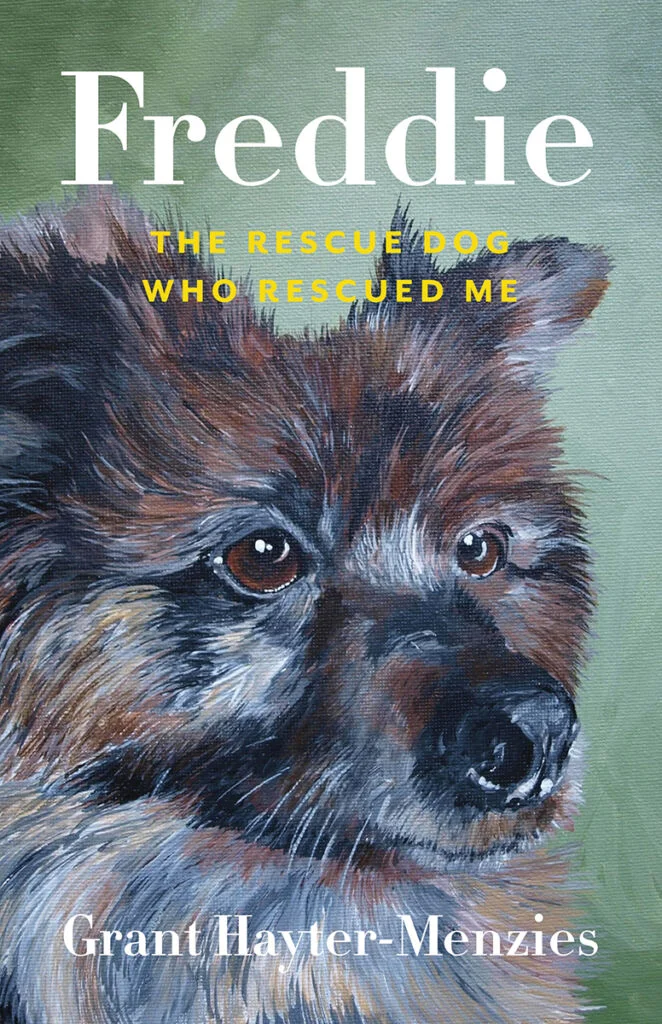Val's Book Reviews

Freddie: The Rescue Dog Who Rescued Me
by Grant Hayter-Menzies
Victoria: Heritage House, 2023
$24.95 / 9781772034615
Grant Hayter-Menzies has immortalized his beloved dog Freddie in this charming book. His tribute to a very special little dog is both poignant and insightful, showing us how much dogs can teach us about love.
Once again, this author has shown his readers the deep connection that exists between humans and animals by allowing us to share his own personal journey with a small rescue dog named Freddie, who spent the last eleven years of his life with his forever family. In turn, Freddie, despite being abused in a puppy mill for the first two years of his life, learnt how to adapt to a happier, safer world and in return taught the author and his family the true meaning of unconditional love and understanding until the end of his all too short life.

Hayter-Menzies’ heart-warming story is both personal and educational. As Linda Rogers says in her Foreword: “Freddie’s life began as a Dickensian horror story and was transformed by the affection of three dads, Grant, Les, and Rudi.”
The author begins his story at the Grand Canyon, one year after he and his then husband, Les, had adopted Freddie from the Victoria branch of the BCSPCA. They were photographing Freddie there and this attracted attention from tourists who admired the little dog.
Freddie and his eight siblings had been shipped to the BCSPCA via the Drive for Life Programs who had in turn rescued him from “a world of troubles. He had spent his first year or two of life with an animal hoarder in the British Columbia interior, lacking sufficient food, veterinary care, and anything approaching socialization or, we had to assume, love.”

Freddie was a Pomeranian cross of approximately fifteen pounds, so was “technically a spitz” like Muggins, the dog Hayter-Menzies wrote about in another book. In fact, it was having Freddie that inspired him to write more books about animals. In addition, the author’s parents and grandparents had been animal lovers so that strong and close connection with all animals was bred in him, growing up in a house that was always full of animals.
Prior to adopting Freddie, Grant had loved many animals including a dog named Jesse, a mutt who stole his heart and then broke it when she finally died of old age. Eventually he and Les decided to look for a rescue dog through the BCSPCA- and thus Freddie had come into their lives.
In memorable detail, the author describes their first meeting; how Freddie initially preferred to be with Les before finally also accepting him; their journey together through some of the most challenging years of both his personal and professional life which included his divorce from Les; and finally, through the bravery Freddie displayed following his final horrific diagnosis. Throughout it all, Freddie taught Grant Hayter-Menzies the true meaning of loyalty and courage in the best and the worst of times.
It would be wrong to detail all these events in a review. It is better for the reader to experience them all through the words of the author. Not only does he tell Freddie’s own story to perfection, but he also invites his readers to enjoy stories of other animals from his own past and from the books he wrote including the story of Emily Carr’s Woo, the monkey who became her constant companion and inspired much of her work. And throughout this book, the author alludes to the book he wanted to write about Elizabeth Barrett Brown’s dog, Flush, which had remained on the back burner for too long as life continued to interrupt his plans.
It might well have been hard for Freddie when the author and his husband separated and then divorced, as he spent time with both of his dads in separate locations. But Freddie never complained and was just happy to be part of the lives of the two people he loved.
By 2016, Hayter-Menzies was living in Vancouver and it was there that he met Rudi. They eventually married and Rudi also fell in love with Freddie and was soon accepted by the little dog as his third dad. Rudi was convinced this acceptance of him would take time as Les was still “the alpha dad”, so he didn’t force it. But apparently, one day when Rudi was alone with Freddie and Grant was at work “he was sitting on the sofa making notes for a meeting when Freddie jumped up and nestled beside him. . . just as he had done that evening in 2010 with me . . . Freddie had decided this dad was probably OK after all.” He now had a new family and Rudi had become the new alpha dad.
When Freddie received his devastating diagnosis of cancer along with a heart condition his dads had been able to manage with medication, the author began keeping a diary that shows the painful roller coaster of events and emotions over the last two years of Freddie’s life.

It says much about Freddie’s character that following his death, Rudi and Grant received hundreds of emails, messages, letters, notes, cards, gifts, and flowers of condolence. One came from the Duchess of Cornwall (now Queen Camilla). In 2018, as President of Brooke Action for Working Horses and Donkeys, she had honored “my biography of Dorothy Brooke, by reading from the book at a Brooke Carols Service in Guards’ Chapel. The copy I gave her showed me with Freddie on the dust cover.” Her note was handwritten and expressed her deep understanding of the loss of Freddie.
After his death, Rudi and Grant slowly adjusted to their life without Freddie, but it was far from easy. They were finally able to welcome another rescue dog into their shattered lives, which, when all was said and done, was probably inevitable. His name is Niko.
This story of Freddie will wrench your heart into a million pieces, especially if you have ever loved and lost a beloved pet. I cannot recommend it enough as I am sure it will help heal those who are currently suffering.
Grant Hayter-Menzies is a biographer and historian who has specialized in the stories of strong women, along with the unsung heroes of the past, especially the roles that animals played in wartimes.

Link to Original Review
“The Ormsby Review, named for pioneering historian and UBC professor Margaret Ormsby, is a remarkable and comprehensive online review of more British Columbia books than you ever imagined existing — the west coast publishing market is lively. It covers fiction, poetry, politics, memoir and much else, as well as a lot of local and west coast history.” – Christopher Moore, September 14, 2020.
Editor and Publisher: Richard Mackie
Mission Statement: The British Columbia Review, formerly The Ormsby Review, is a lively and inclusive Vancouver-based online journal devoted to the literature, arts, culture, and society of British Columbia. Our mandate is to review books by BC-based writers wherever they choose to publish them. We review books from the member publishers of the ABPBC (Association of Book Publishers of BC), but we also review books that are privately printed, self-published, or published by BC writers at publishing houses elsewhere in Canada or abroad. When possible, we also find BC reviewers. Our accessible and authoritative reviews and essays, written by experts in their fields, are packaged as illustrated magazine articles.
The British Columbia Review works with writers, publishers, and literary professionals across Canada to promote books published by BC writers or about British Columbia in all its diversity. We include books by all authors, regardless of race, age, ability, sexual orientation, gender or gender identity, ethnicity, religion, political belief, marital or family status, and/or status as Indigenous, Métis, or Inuit.
The editorial offices of The British Columbia Review are located near Commercial Drive in East Vancouver, in the traditional, unceded, and sometimes overlapping territories of the Musqueam, Squamish, and Tsleil-Wauuth peoples. Indigenous British Columbia, the land on which we live and create, extends over a large area comprising three culture areas, eight language families, and 32 distinct languages. We endeavour to review all books by and about Indigenous BC. Those reviews can be accessed directly here.
